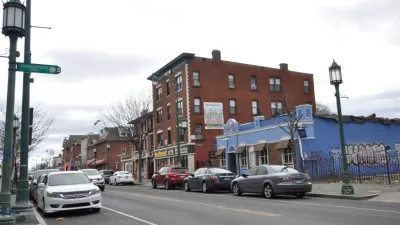Across the country, affordable housing projects depend on tax credits to encourage investment; the possibility of a lower tax rate has already affected their funding.
"Trump hasn’t yet acted on his plan to slash the business tax rate from 35 percent to 15 percent, but the campaign pledge alone is already reshaping how affordable housing developers fund their work," according to Josh Cohen in Next City. Much of the funding for affordable housing comes from Low-Income Housing Tax Credit (LIHTC), which incentivizes businesses to invest in affordable housing in order to get a lower corporate tax rate. These investments fund projects around the country. "For example, of the $23 million that Capitol Hill Housing spent on a recently built 88-unit rent-restricted apartment building, $5.6 million came from LIHTCs," Cohen writes.
If corporate taxes are slashed by more than half, there will be less incentive to invest in these projects. "With a significantly lower tax burden dangling on the horizon thanks to Trump, would-be investors have less incentive to pay top dollar for LIHTCs; developers have already dropped their “asking price” by 10 cents or more per tax credit to compensate," Cohen writes. According to National Low Income Housing Coalition President Diane Yentel, the effects of these proposed tax cuts can already be felt. "Either causing investors to hold off on investments altogether, or to provide less equity per dollar of the credit. In either case, it means less money available for the development of affordable housing," she tells Cohen.
FULL STORY: Trump Tax Promise Is Already Affecting Affordable Housing

Alabama: Trump Terminates Settlements for Black Communities Harmed By Raw Sewage
Trump deemed the landmark civil rights agreement “illegal DEI and environmental justice policy.”

Planetizen Federal Action Tracker
A weekly monitor of how Trump’s orders and actions are impacting planners and planning in America.

Why Should We Subsidize Public Transportation?
Many public transit agencies face financial stress due to rising costs, declining fare revenue, and declining subsidies. Transit advocates must provide a strong business case for increasing public transit funding.

Understanding Road Diets
An explainer from Momentum highlights the advantages of reducing vehicle lanes in favor of more bike, transit, and pedestrian infrastructure.

New California Law Regulates Warehouse Pollution
A new law tightens building and emissions regulations for large distribution warehouses to mitigate air pollution and traffic in surrounding communities.

Phoenix Announces Opening Date for Light Rail Extension
The South Central extension will connect South Phoenix to downtown and other major hubs starting on June 7.
Urban Design for Planners 1: Software Tools
This six-course series explores essential urban design concepts using open source software and equips planners with the tools they need to participate fully in the urban design process.
Planning for Universal Design
Learn the tools for implementing Universal Design in planning regulations.
Caltrans
Smith Gee Studio
Institute for Housing and Urban Development Studies (IHS)
City of Grandview
Harvard GSD Executive Education
Toledo-Lucas County Plan Commissions
Salt Lake City
NYU Wagner Graduate School of Public Service





























